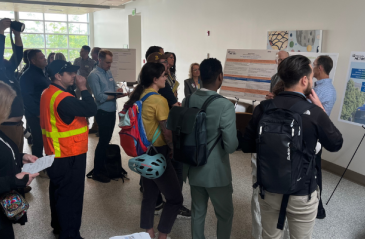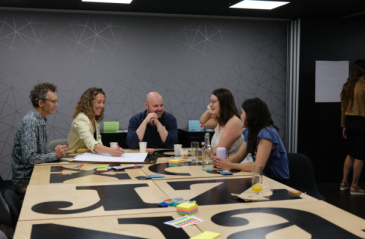
The information barriers holding back climate action and how to break them

Anne Washington focuses on the crossroads between governments use of technology and data science
Share articleGoverments have improved technology management and informatics but scope for improvement remains
Share articleFor creating digital systems to find government data, smaller administrations have the advantage
Share articleWe put our vision for government into practice through learning partner projects that align with our values and help reimagine government so that it works for everyone.
One of the most famous images in the movie All the President's Men is of reporters Woodward and Bernstein digging their way through a mountain of paper at the Library of Congress as part of their investigation into the Watergate scandal.
For Anne L. Washington, computer scientist and 2016-2017 Fellow at the Data & Society Research Institute, who used to work at the Library of Congress, the scene is a vivid reminder of how things used to be. "The books are still there - and they still need to be there," she reflects. "But now, instead of asking a government librarian, people are asking an internet search box. Technology still hasn't quite replicated the trusted interaction we have with librarians."
As a digital government scholar who specialises in open government, Washington is ideally placed to analyse governments' use of technology to safeguard and open up their information. This year, she is a fellow at the Data & Society Institute in Manhattan, a non-profit thinktank focused on the implications of data-driven technology for governments, civic groups and citizens. Her fellowship project is about critical thinking skills for interpreting data analytics. Her work focuses on the crossroads between government use of technology and data science. "Many concerns about artificial intelligence are really public policy concerns that involve technology innovation," she says.
"Large collections of information about human society, such as demographic statistics, have been created and managed by governments. The Domesday book of 1086 is arguably one of the oldest government data sets," she points out. "Congress has managed to keep track of daily business through a staggering number of documents since 1789. The existing mechanisms for recording and finding government information are very refined because they have been able to work, literally, for millennia."
She goes on to say, though, that there is definite scope for improvement. "I don't think digital modernisation has incorporated what we learned when designing efficient analogue processes," she says. "This is really where my research sits - as a 'digital government scholar'. We still have the opportunity to take incredibly deep expertise and augment it within the data-driven world."
Washington is an assistant professor at George Mason University in Arlington, Virginia and has been affiliated with Data & Society since 2014. In both organisations, she is able to focus her attention on technology management and informatics.
"We use a secret language in academia sometimes," she says, laughing. "'Technology management' is about how organisations leverage digital assets for strategic business goals. My doctorate is in management information systems. On the other side of that is 'informatics', which comes from the library science tradition. Over centuries, librarians have refined how to store and retrieve knowledge so people can find what they need and walk away smarter. Informatics takes this basic idea and scales it up for massive digital collections."
Different administrations have sought to achieve open government - with varying degrees of success - but Washington says that smaller governments have had a definite advantage when it comes to designing new systems that can locate data quickly, accurately and effectively. "In terms of the open data supply, the US has taken the lead," she says.
"But in terms of creating digital systems to find government data, there are smaller places, like Estonia, and smaller administrative units, like the city of Philadelphia, which are a lot more nimble. Within my area of expertise of legislative technology, Tasmania took the lead in creating new data infrastructure. There was no embedded constituency at the time, so they could implement cutting-edge technology. Larger jurisdictions are far behind now, because they have entrenched interests that prevent swift progress."
The crossroads between government and academic data science is complex, but offers a myriad of opportunities to make a real impact. As for her future plans, she says that there is no imminent return to the public sector on the cards, but she's not about to rule it out in perpetuity. "I have just received a five-year grant from the National Science Foundation - an Early Faculty Research Career grant - to investigate US open data policy," Washington says. "We will be learning how data scientists actually reuse open data and how to improve the potential of open data investments.”
Washington - knowledgeable, friendly and keen to talk - would appear to be ideally suited to sparking a conversation between the data scientists who use government data, and the government professionals who produce it. If all goes to plan, the end result should be a divide that's bridged and data sets that are far more searchable and easy to use.












